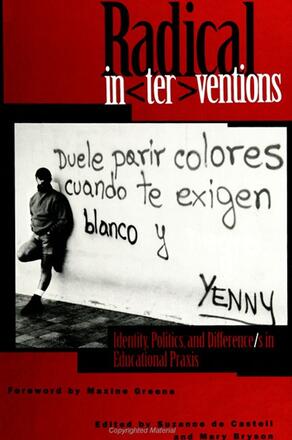
Radical Interventions
Identity, Politics, and Difference/s in Educational Praxis
Alternative formats available from:
Minority scholars offer a critical and often radical rethinking of fundamental questions concerning identity, politics, and difference/s as these inform educational theory and practice.
Description
In this volume, minority scholars in the humanities and the social sciences, working within what are often profoundly hostile contexts, speak about their efforts to disrupt and transform business as usual in the Academy. Theirs is a critical, and often radical rethinking of fundamental questions concerning identity, politics, and difference/s as these inform education theory and practice.
Suzanne de Castell is Professor at Simon Fraser University and is senior editor of Literacy, Society, and Schooling and Language, Authority, and Criticism. Mary Bryson is Assistant Professor at University of British Columbia.
Reviews
"This book challenged me as an educator precisely where I live. I continually had to stop reading and question myself, my perceptions, my education, my teaching, my university community, my research, my methods, my collegial relationships. The book creates an opportunity for an explosion of honest and candid reflection on topics far too often ignored or avoided in education and research.
"It is very compelling and challenging. The authors do a superb job of including the voices of the individuals about whom they are writing, and this breathes life into the issues under consideration. The book truly is an eye-opener, forcing the reader to look through other eyes, even though the view is often painful to behold.
"The topics are tremendously significant. As I read, I felt--in the midst of being challenged to think and rethink my own positions--a sense of sheer relief that these issues were being discussed, that words were being said that have needed to be said for a long time in the Academy. It gave me hope for the future of the Academy that the authors have not allowed their voices to be silenced in the face of the oppression and repression that exist in higher education." --Ann C. Diver-Stamnes, Humboldt State University
"I like the fact that someone has had the courage to tackle the questions raised in this book. It's a topic whose time has come. Too much of what is written for academic audiences and what we read for academic purposes is 'cheer leading' to bring the 'good news.' It's time for the hard questions, the difficult not necessarily redemptive narratives. I too am tired of speaking to those who will not hear. I hope this book is heard." -- Diane Brunner, Michigan State University